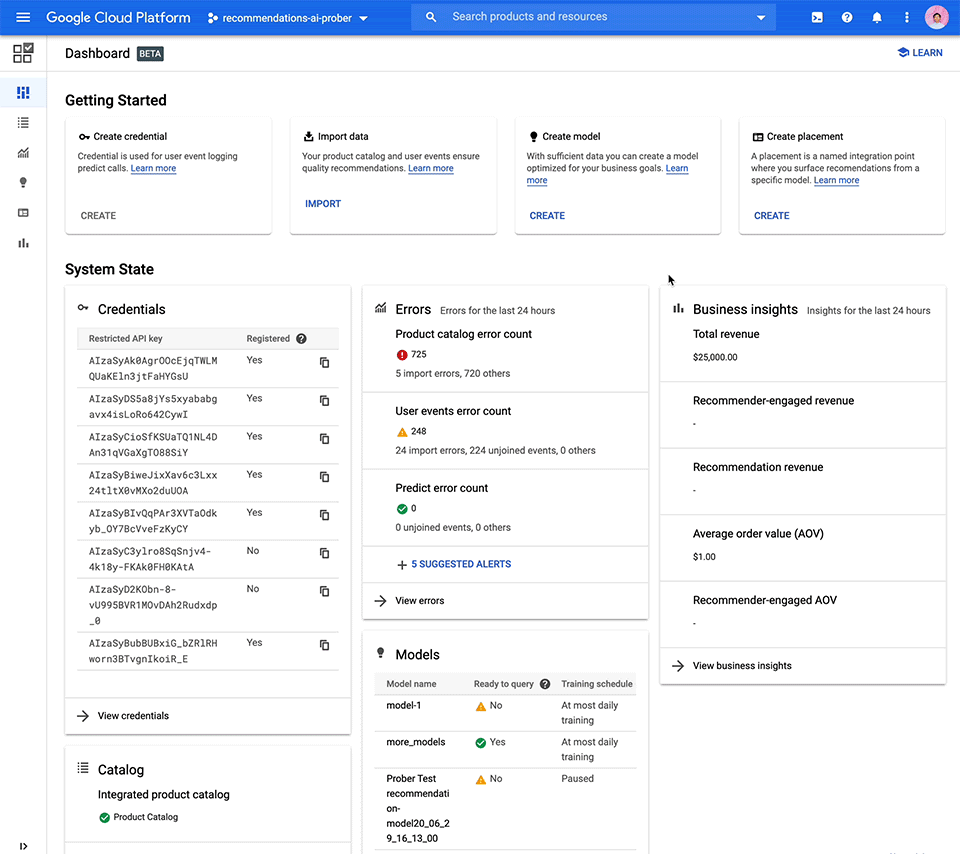 AI
AI
 AI
AI
 AI
AI
Google LLC said today that its Recommendations AI tool is now publicly available in public beta test mode.
Recommendations AI was first announced in private beta in April 2019, and relies on Google’s sophisticated artificial intelligence tools to help retailers deliver highly personalized recommendations to their customers.
In a blog post, Google Product Manager Pallav Mehta said retailers can use the new tools to shift the emphasis from individual products to each customer, by serving each one with personalized product recommendations. Recommendations AI draws on each user’s shopping history and browsing habits to find products that are likely to be of more interest to them, and early adopters of the tool say they’ve seen a noticeable increase in sales since they’ve started using it, Google said.
“By putting a greater emphasis on each individual customer rather than on an item, Recommendations AI is able to piece together the history of a customer’s shopping journey and serve them with personalized product recommendations,” Mehta said. “Its context hungry deep learning models use item and user metadata to draw insights across millions of items at scale and constantly iterate on those insights in real time in a way that is impossible for manually curated rules to keep up with.”
Customers can create a variety of recommendation models with the new tool, drawing on data and events from Google Cloud services such as Merchant Center, Google Tag Manager, Google Analytics 360 and BigQuery, enabling retailers to target customers based on a variety of metrics. New models are trained in just two to five days, depending on their complexity, before they can be used to start serving up recommendations.
Since Recommendations AI was first launched last year, Google has worked with its Google Brain and Google Research teams to enhance its capabilities. Recommendations AI models can now support massive catalogs of “tens of millions of items,” Mehta said.
“Recommendations AI is also capable of correcting for bias with extremely popular or on-sale items, and can better handle seasonality or items with sparse data,” he added. “Our model training infrastructure allows us to re-train your models daily to draw insights from changing catalogs, user behavior, or shopping trends and incorporate them into the recommendations being served.”

Early adopters said Recommendations AI has boosted the e-commerce side of their business operations. Sephora USA Inc., which sells beauty and personal care goods, said the tool helps it provide the same highly personalized shopping experience to its customers online as they receive in its physical stores.
“We started working with Google Cloud to explore how we could leverage its innovative machine learning technology to provide enhanced personalization to our online customers through product recommendations,” said Jaclyn Luft, Sephora’s manager of site personalization and testing. “Since implementing Recommendations AI, we’ve seen impressive results with a 50% increase in CTR on our product pages and a nearly 2% increase in overall conversion rate on our homepage relative to our previous ML-driven recommendations.”
Meanwhile, Digitec Galaxus AG, which claims to be the largest online retailer in Switzerland, said Recommendations AI helped ensure it was ready for the sudden, unexpected surge in online shopping that followed the onset of the coronavirus pandemic and the resulting worldwide shutdowns of physical stores.
“During the pandemic, finding the product you need is more important than ever,” said Christian Sager, product owner for personalization at Digitec Galaxus. “In the past few months, we’ve noticed a strong increase in the usage of recommendations in general, with Recommendations AI performing with up to a 40% additional increase in CTR compared to the previous period. Customer needs evolved as the pandemic continued, and Recommendations AI adapted well to the changes and allowed us to keep up with our customers and their preferences.”
Constellation Research Inc. analyst Holger Mueller told SiliconANGLE that recommendation engines are a key building block of many next-generation applications. However, he said the quality of such tools is critical, and implementing and running such systems is a risky, labor intensive and constantly changing process.
“Google is trying to help with its Recommendations AI capability, and given its track record in the field, it’s something that executives will need to pay attention to,” Mueller said.
Google said Recommendations AI is available now with three volume-based pricing tiers for predictions, plus separate charges for model training and tuning.
Support our mission to keep content open and free by engaging with theCUBE community. Join theCUBE’s Alumni Trust Network, where technology leaders connect, share intelligence and create opportunities.
Founded by tech visionaries John Furrier and Dave Vellante, SiliconANGLE Media has built a dynamic ecosystem of industry-leading digital media brands that reach 15+ million elite tech professionals. Our new proprietary theCUBE AI Video Cloud is breaking ground in audience interaction, leveraging theCUBEai.com neural network to help technology companies make data-driven decisions and stay at the forefront of industry conversations.